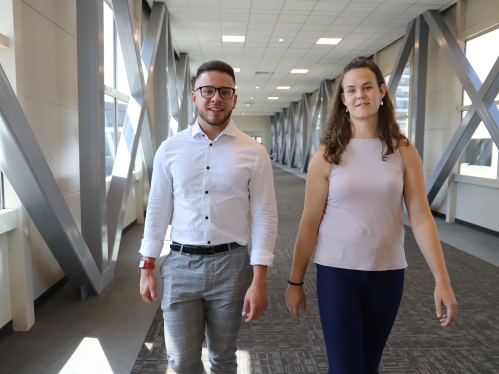Doctor of Philosophy in Public Health (PhD)
About the PhD in Public Health
The Rutgers School of Public Health and Rutgers School of Graduate Studies' rigorous PhD in Public Health degree is designed to support public health professionals seeking a research-based graduate program, offering advanced study across five concentration areas.

PhD in Public Health Format
The PhD in Public Health is a full-time program for candidates dedicated to doctoral-level research.
A specific course of study is followed by all PhD in Public Health students and depends on their concentration. During a student’s first and second years of study, they are required to complete Doctoral Colloquium I and II, respectively.
PhD in Public Health students complete seminar coursework each semester that is dedicated to current topics in public health and professional development, fulfill a teaching experience, and are immersed in research.
Following the fulfillment of their course requirements, students will complete a comprehensive qualifying exam (written and oral), as well as a dissertation.

Academic Departments & Concentrations
Biostatistics and Epidemiology (specialized pharmacoepidemiology courses available)
Environmental and Occupational Health
Social and Behavioral Health Sciences and Health Systems and Policy
Accordion Content
-
Each student must:
- Participate in Doctoral Colloquium I and II in Year 1 and Year 2, respectively
- Take PhD Seminar each Fall and Spring semester
- Complete an individual development plan each year of their PhD in Public Health studies
- Complete a teaching requirement
- Be immersed in research
- Pass a qualifying exam
- Defend a dissertation
The curriculum must total a minimum of 72 credits, including a minimum of 24 credits of doctoral research. Each concentration has its own set of required specialization courses.
Satisfactory progress extends beyond GPA -- students must meet three major milestones in a timely fashion.
- PhD in Public Health students are expected to advance to candidacy within three years of admission to the doctoral program.
- Students should defend their dissertation proposal within one year of advancing to candidacy.
- A student's entire course of study, including coursework, qualifying exam, thesis research and defense, must be completed within seven years of admission to the PhD in Public Health Program.
-
PhD in Public Health students participate in Doctoral Colloquium I and II each Fall and Spring semester in Year I and Year 2, respectively. In Doctoral Colloquium I (RESH 0701), students gain knowledge and skills to prepare a comprehensive literature review which students are encouraged to submit for publication. In Doctoral Colloquium II (RESH 0702), students gain knowledge and skills to develop a high-quality grant application (e.g., F31) or equivalent to obtain mentored research training and funding while conducting dissertation research.
-
PhD in Public Health students participate in PhD Seminar (RESH 0730) each Fall and Spring semester they are enrolled at the Rutgers School of Public Health. The purpose of the PhD Seminar is to familiarize students with the major streams of research on pressing topics in public health, help students to complete the PhD program by building a community, and help students develop the skills necessary to become an engaged scholar and be competitive on the academic job market.
-
PhD in Public Health students must complete a teaching requirement.
Prior to or during the semester serving as a course assistant, the student should enroll in at least one of the training options listed below. The best option for each student will be based in collaboration with the Executive Director for Doctoral Studies, their teaching career goals, and discussions with the Faculty Academic Advisor.
Teaching Requirement Options
- Complete the Doctoral Course for Teaching: HBSP 0725 - Effectively Teaching and Training Adults (3 credits). The course is offered in an online/asynchronous format during Summer semesters. The course focuses on traditional and innovative teaching approaches to facilitating learning in academic, organizational or community settings, taking into consideration the characteristics of the adult learner.
- Earn a Teaching Certificate from the Rutgers Teaching Assistant Program (TAP)
First year doctoral students may not teach any courses or serve as course assistants during their first semester. Doctoral students typically serve as course assistants starting in the second year and after. Doctoral students may teach a course later in their PhD studies with permission from the Executive Director for Doctoral Studies, the Associate Dean for Academic Affairs, the Department Chair, the Concentration Director, and the Faculty Academic Advisor.
-
All PhD in Public Health students are expected to engage in research activities with Rutgers School of Public Health faculty under the direction of their faculty advisor. This experience may vary by concentration and faculty advisor. Students are recommended to present and, if feasible, publish at least one first authored paper prior to their dissertation proposal defense.
-
Each PhD in Public Health student must complete and pass a qualifying examination (written and oral) before being admitted to PhD candidacy. The qualifying examination evaluates the student's competence in their concentration and assesses the student’s readiness to undertake a dissertation. The qualifying examination comprises a written component and an oral component and is scheduled annually, typically during the first week of June. Once the student has completed their coursework, the student will sit for the qualifying examination (at the end of the second year).
Each concentration establishes the content and structure of the qualifying examination. The qualifying examination will be assessed by the student’s Qualifying Exam Committee. A student’s qualifying examination committee comprises four faculty members with expertise in the area; all of whom must be School of Public Health primary or secondary faculty members (typically three faculty from within the student’s department and one external to the student’s department but within the School of Public Health and no less than two primary faculty members). The Qualifying Exam Committee Chair must be a primary faculty member of the School of Public Health and a full member of the PhD in Public Health Graduate Program. The student’s advisor cannot chair the Qualifying Exam Committee. The qualifying examination is assessed by faculty members. The qualifying examination may result in a pass, deferred pass with conditions, or a fail.
-
After the granting of the doctorate, the Rutgers School of Graduate Studies will have the dissertation archived. The dissertation must, therefore, be prepared with the same care as if it were to appear in printed form. The abstract that must accompany the dissertation will be published in dissertation abstracts and, therefore, must be ready for publication when it is submitted to the Dean. Rutgers University Libraries and ProQuest LLC, of Ann Arbor, Michigan, will archive the dissertation and publish the abstract. Information concerning the preparation of the dissertation and abstract and the online publishing agreement that the doctoral candidate must give to ProQuest are available in the Office of the School of Graduate Studies, Rutgers University, New Brunswick.
-
The PhD in Public Health degree requires a minimum of 72 credit hours, including a minimum of 24 credits of doctoral research. Candidates for the PhD in Public Health degree are expected to enroll full-time and are required to be immersed in research, earn a teaching certificate (or complete HBSP 0725), participate in Doctoral Colloquium I and II, pass a qualifying examination (with written and oral components), as well as complete and defend original dissertation research.
9 CREDITS-Public Health Core Courses: Students in all concentrations must take the PhD in Public Health core courses.
39 CREDITS-Concentration and Elective Courses: Each concentration has developed its own set of required and elective courses. Students may visit the School of Public Health website, review the School Catalog, or meet with their Concentration Director to learn more about their specific concentration’s curricula.
24 CREDITS-Doctoral Research: Includes one credit of Ethical Scientific Conduct (1611-5556) taken in the Spring semester of the first year of full-time study, three credits of Dissertation Proposal Seminar (RESH 0761) taken in the Spring semester of the second year of full-time study, and 20 credits of Doctoral Research (RESH 0760).